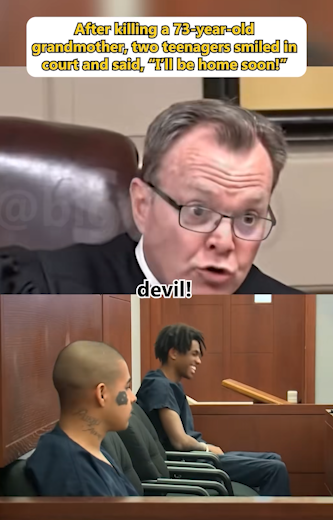
Teen Carjackers Sentenced to Life: Judge Declares “Adult Crimes Bring Adult Time”
A shocking and tragic case out of [City/State] has reignited national debate over how the justice system should handle violent crimes committed by juveniles. Two 17-year-old teenagers have been sentenced to life in prison without the possibility of parole after being tried as adults for the brutal killing of 73-year-old Linda Frickey during a botched carjacking.
The Crime
The incident occurred as Frickey was leaving a Walmart after purchasing a birthday cake for her five-year-old granddaughter. As she approached her vehicle, she was attacked by the two teens, who pepper-sprayed her and attempted to steal her SUV.
Tragically, Frickey was still buckled into the seat when the teens drove off. Witnesses reported seeing her being dragged down the street, her arm crushed and her body sustaining severe injuries. She died in agony before help could arrive, her screams echoing through the neighborhood.
Courtroom Behavior Sparks Outrage
During their trial, the two teens showed little remorse. One reportedly laughed in court, saying, “I’ll be home soon,” while the other was caught on video smirking during the proceedings. Defense attorneys argued that their age should grant them leniency, and that their sentences should reflect their potential for rehabilitation.
However, the judge did not agree.
The Verdict
In a dramatic and final moment, the judge announced:
“I overturn the previous verdict and sentence you to life in prison without the possibility of parole.”
The teenagers’ expressions reportedly shifted from arrogance to disbelief as they realized the gravity of their punishment.
“The justice we sought has finally come,” said a representative from Frickey’s family, who were present in court. “She was a mother, a grandmother, and a friend. What happened to her was inhuman.”
Tried as Adults: Legal and Educational Implications
The case brings attention to the ongoing debate over juvenile justice, particularly when minors commit violent felonies. Though typically focused on rehabilitation, juvenile court systems can transfer cases to adult court when the severity of the crime warrants it.
Legal analysts note that this case highlights the tension between neurological science — which suggests adolescent brains are not fully developed — and public calls for accountability in extreme cases.
Educational Takeaway
For educators, this case serves as a real-world example to discuss:
- The limits of juvenile sentencing
- Ethics in criminal justice
- How courts balance public safety, rehabilitation, and victims’ rights
Conclusion
While the law aims to protect minors, it also recognizes that some crimes cross a moral line. In this case, the court’s final decision sent a clear message: some acts, no matter the age of the offender, demand the full weight of justice.



